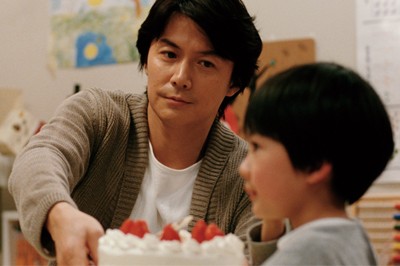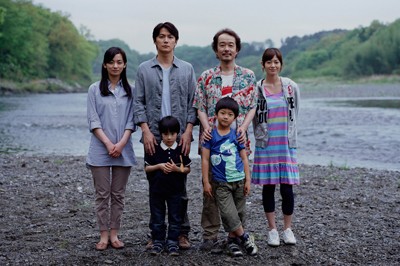| Reviews & Columns |
|
Reviews DVD TV on DVD Blu-ray 4K UHD International DVDs In Theaters Reviews by Studio Video Games Features Collector Series DVDs Easter Egg Database Interviews DVD Talk Radio Feature Articles Columns Anime Talk DVD Savant Horror DVDs The M.O.D. Squad Art House HD Talk Silent DVD
|
DVD Talk Forum |
|
|
| Resources |
|
DVD Price Search Customer Service #'s RCE Info Links |
|
Columns
|
|
|
Like Father, Like Son (2014)
IFC Films // Unrated // January 17, 2014
List Price: Unknown [Buy now and save at Fandango]

Cultural differences largely impact the films that come from that specific country. When films are released from different individuals around the world, it is to be expected that everything from the plot and its messages to the character disposition will be portrayed in an entirely different way. In Japanese cinema, the theme of family is quite common. It's very intriguing to see how the family structure works in various different ways from how Americans are used to seeing it in motion pictures. This isn't the first time that writer/director Hirokazu Koreeda has worked with such messages, as well as actors both older and younger. With such a talented filmmaker in mind, it's no wonder that his newest motion picture Like Father, Like Son took home the Jury Prize from the Cannes Film Festival. There isn't a single doubt in my mind that this is a well-crafted drama that will keep you engaged, regardless of your country of origin. Films such as these don't come around very often.
Ryota Nonomiya (Masharu Fukuyama) is a very successful businessman driven by money. He has a beautiful home and a seemingly perfect family. His wife, Midori Nonomiya (Machiko Ono) takes care of their child, Keita Nonomiya (Keita Ninomiya) and keeps him motivated to pursue practicing the piano. One day, the parents learn that their biological son was switched with another child after birth. Ryota must make a life-changing decision and choose between his biological son or the boy he raised as his own for the past six years. This leads him and Midori on an emotional roller coaster ride, as they are forced to interact with the family that has been raising their biological son for all of these years.
Even though Like Father, Like Son speaks a lot about the children in the film, it isn't from their perspective. Rather, it's from the point-of-view of Ryota Nonomiya. Regardless of who the film primarily follows, writer/director Hirokazu Koreeda has ensured that the characters are as complex as possible. This makes for a much more captivating film experience, as we're constantly wondering what causes our characters to act in the way that they do. Instead of telling us everything about the roles, we're left to figure out the majority of it on our own by observing how they handle certain situations. This is an excellent way of keeping the audience on their toes and ensuring that they truly get to know the characters on screen. By the time the credits are rolling, you'll feel as if you've known them for years. A lot of motion pictures that revolve around such topics fall on the melodramatic side of the fence. Fortunately, Koreeda has ensured that this is a raw experience that feels utterly natural. The title of the picture has two strong meanings that both revolve around Ryota. Despite the fact that it's a difficult feat, Koreeda manages to keep us interested by constantly moving either the plot or the character disposition, which only increases our interest in what's going on.
The two families that are considering switching their children are incredibly different. Ryota is able to provide his family with a financially stable life, but he's cold and distant. He expects a lot out of his child, but spends an extremely limited amount of time with him. Midori tries to please both her husband and her child, as she serves as the emotional support of the family. Meanwhile, Yudai Saiki (Riri Furanki) is the father of the second family. He's a storeowner and doesn't have very much money. However, they're an incredibly close and sentimental household. Everybody participates in one way or another in order to help the shop. His wife, Yukari Saiki (Yoko Maki) is a loving woman who also serves as the emotional support of the family. Since the children have grown up in completely different environments, they exhibit contrasting behaviors. Keita Nonomiya is a quiet child who enjoys spending his time playing Wii Sports. He practices the piano in order to make his parents proud, but doesn't appear to be entirely passionate about it. Meanwhile, Ryota's biological son, Ryusei Saiki (Shogen Hwang) is incredibly playful and passionate, as he questions nearly everything that he comes across. This allows for the children to be complex characters, just as the adults are.
Writer/director Hirokazu Koreeda's screenplay manages to keep us utterly engaged through the majority of the film. However, my biggest gripe is that it runs a little bit too long. Even though it's only two hours, the final act drags its feet to the finish line. While I understand what Koreeda is trying to get across, it could have been conveyed in a more taut fashion. Some may complain about the predictability of it all, but I wasn't bothered too much by it. Like Father, Like Son is more about the emotional journey than it is about having a shocking, or unexpected turn of events. Not only will you see the ending coming, but it's very sentimental. While, I personally found it to be a fitting and appropriate ending to this motion picture, it may leave some with a less than favorable final impression. Regardless of how you feel about the end of Like Father, Like Son one cannot deny that Koreeda's screenplay is well-crafted.
There isn't a single problem with any of the performances seen here. In fact, each one of them is complex and beautiful in their own rite, and yes, even the representations provided by the children are great. Masharu Fukuyama is absolutely exceptional in the role of Ryota Nonomiya. It's a subtle performance, yet he displays a wide range of character without necessarily saying very much. His facial expressions say a million words, which is a huge compliment. Machiko Ono is just as excellent as his wife, who holds everything in until she can no longer keep it hidden under the surface. Riri Furanki and Yoko Maki are excellent as Yudai Saiki and Yukari Saiki, respectively. They manage to bounce a lot of great energy off of Fukuyama and Ono in order to make for some truly phenomenal interactions. Keita Ninomiya and Shogen Hwang are both outstanding as the two children. Not only are they both completely adorable, but Koreeda has pulled some great performances out of them. Unlike many motion pictures, they actually come across as children. This is a difficult goal to accomplish in film, and Like Father, Like Son goes above and beyond.
Not only is writer/director Hirokazu Koreeda fantastic with writing his features, but he's also a wonderful visual storyteller. There's a lot to love here when it comes to the visuals. The cinematography is fitting and inspired, as it makes several changes depending upon location and the emotions being portrayed. The film avoids bright colors and has a rather muted color palette. The camerawork is absolutely wonderful, as it constantly conveys a wonderful sense of perspective and expression. There aren't very many dramas out there that are able to keep you captivated by not only its story and performances, but also by its visual presence.
This is unlike anything we'll ever see from Hollywood. It's complex, inspired, and trusts its characters. There are several risks taken in the way that Koreeda conveys his characters, but they pay off. This is a strong screenplay that explores a very intriguing story that just begs to be spoken about after the credits are done rolling. Not only are the adults engaging, but the children come across as being just as natural and raw, even though they're still believable as real children. None of this feels forced. Even though the final act comes across as being a bit bloated, this is still an emotional journey well-worth taking. Like Father, Like Son is a well-crafted piece of cinema that explores fascinating concepts with a whole lot of heart. Highly recommended!

|
| Popular Reviews |
| Sponsored Links |
|
|
| Sponsored Links |
|
|
| Release List | Reviews | Shop | Newsletter | Forum | DVD Giveaways | Blu-Ray | Advertise |
|
Copyright 2024 DVDTalk.com All Rights Reserved. Legal Info, Privacy Policy, Terms of Use,
Manage Preferences,
Your Privacy Choices | |||||||











